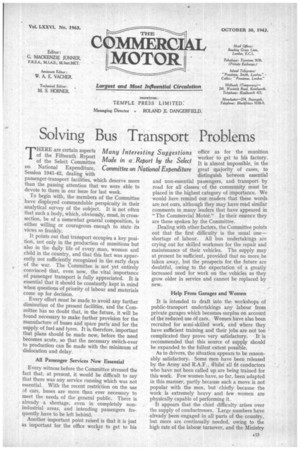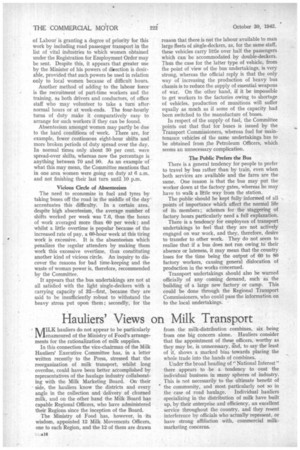Solving Bus Transport Problems T HERE are certain aspects of the
Page 17

Page 18

If you've noticed an error in this article please click here to report it so we can fix it.
Fifteenth Report of the Seed Committee on National Expenditure, Session 1941-42, dealing With passenger-transport facilities, which deserve more than the passing attention that we were able to devote to them in our issue for last week.
To begin with, the members of the Committee have displayed commendable perspicuity in their analytical survey of the subject. It is not often that such a body, which, obviously, must, in crosssection, be of a somewhat general composition, is either willing or courageous enough to state its views so frankly.
It points out that transport occupies a key position, not only in the production of munitions but • also in the daily life of every man, woman and child in the country, and that this fact was apparently not sufficiently recognized in the early days of the war. The Committee is not yet entirely convinced that, even now, the vital importance of passenger transport is fully appreciated. It is essential that it should be constantly kept in mind when questions of priority of labour and materials come up for decision.
Every effort must be made to avoid any further diminution of the present facilities, and the Committee has no doubt that, in the future, it will be found necessary to make further provision for the manufacture of buses and spare parts and for the supply of fuel and tyres. It is, therefore, important that plans should be made now, before the need becomes acute, so that the necessary switch-over to production can be made with the minimum of dislocation and delay.
All Passenger Services Now Essential Every witness before the Committee stressed the fact that, at present, it would be difficult to say that there was any service running which was not essential. With the recent restriction on the use of cars, buses are more than ever necessary to meet the needs of the general public. There is already a shortage, even in completely nonindustrial areas, and intending passengers frequently have to be left behind.
Another important point raised is that it is just as important for the office worker to get to his office as for the munition worker to get to his factory. It is almost impossible, in the great majority of cases, to distinguish between essential and non-essential passengers, and transport by road for all classes of the community must be placed in the highest category of importance. We would here remind our readers that these words are not ours, although they may have read similar comments in many leaders that have appeared in "The Commercial Motor." Intheir essence they are those spoken by the Committee. Dealing with other _factors, the Committee points out that the first difficulty is the usual one— shortage of labour. All bus undertakings are crying out for skilled workmen for the repair and maintenance of their vehicles. The supply may at present be sufficient, provided that no more be taken away, but the prospects for the future are doubtful, owing to the expectation of a greatly increased need for work on the vehicles as they grow older in service and cannot be replaced by new.
Help From Garages and Women It is intended to draft into the workshops of public-transport undertakings any labour from private garages which becomes surplus on account of the reduced use of cars. Women have also been recruited for semi-skilled work, and where they have sufficient training and their jobs are not too complicated they prove very satisfactory. It is recommended that this source of supply should be expanded to the fullest extent possible.
As to drivers, the situation appears to be reasonably satisfactory. Some men have been released by the Army and R.A.F., *Mist all fit conductors who have not been called up are being trained for this work. Few women have, so far, been adapted in this manner, partly because such a move is not popular with the men, but chiefly because the work is extremely heavy and few women are physically capable of performing it. It appears that the chief difficulty arises over the supply of conductresses. -Large numbers have already been engaged in all parts of the country, but more are continually needed, owing to the high rate of the labour, turnover, and the Ministry of Labour is granting a degree of priority for this work by including road passenger transport in the list of vital industries to which women obtained under the Registration for Employment Order may be sent. Despite this, it appears that greater use by the Minister of his powers of direction is desirable, provided that such powers be used in relation only to local women because of difficult hours.
Another method of adding to the labour force is the recruitment of part-time workers and the training, as both drivers and conductors, of office staff who may volunteer to take a turn after. normal hours or at week-ends. The four-hourly turns of duty make it comparatively easy to arrange for such workers if they can be found. Absenteeism amongst women may partly be due to the hard conditions of work. There are, for example, fewer continuous eight-hour shifts and more broken periods of duty spread over the day. In normal times only about 30 per cent. were spread-over shifts, whereas now the percentage is anything between 70 and 90. As an example of what this may mean, the Committee mentions that in one area women were going on duty at 6 a.m. and not finishing their last turn until 10 p.m.
Vicious Circle of Absenteeism The need to economize in fuel and tyres by taking buses off the road in the middle of the day• accentuates this difficulty. In a certain area, despite high absenteeism, the average number of shifts worked per week was 7.0, thus the hours of work averaged more than 60 per week ; and whilst a little overtime is popular because of the increased rate of pay, a 60-hour week at this tiring work is excessive. It is the absenteeism which penalizes the regular attenders by making them work this excessive overtime, thus constituting another kind of vicious circle. An inquiry to discover the reasons for bad time-keeping and the waste of woman power is, therefore, recommended by the Committee.
It appears that the bus undertakings are not at all satisfied with the light single-deckers with a carrying capacity of 32—first, because they are said to be insufficiently robust to withstand the heavy stress put upon them ; secondly, for the reason that there is not the labour available to man large fleets of single-deckers, as, for the same staff, these vehicles carry little over half the passengers which can be accommodated by double-deckers. Thus the case for the latter type of vehicle, from the point of view of the bus undertakings, is very strong, whereas the official reply is that the only way of increasing the production of heavy bus chassis is to reduce the supply of essential weapons of war. On the other hand, if it be impossible to get workers to the factories owing to shortage of vehicles, production of munitions will suffer equally as much as if some of the capacity had been switched to the manufacture of buses.
In respect of the supply of fuel, the Committee points out that that for buses is issued by the Transport Commissioners, whereas fuel for maintenance vehicles of the same undertakings has to be obtained from ,the Petroleum Officers, which seems an unnecessary complication.
The Public Prefers the Bus There is a general tendency for people to prefer to travel by bus rather than by train, even when both services are available and the fares are the same. One reason is that the bus may put the worker down at the factory gates, whereas he may have to walk a little way from the station.
The public should be kept fully informed of all points of importance which affect the normal life of its members ; schemes for the staggering of factory hours particularly need a full explanation.
There is a tendency for employees of transport undertakings to feel that they are not actively engaged on war work, and they, therefore, desire to transfer to other work. They do not seem to realize that if a bus does not run owing to their absence or lateness, it may mean that the country loses for the time being the output of 60 to 80 factory workers, causing general dislocation of production in the works concerned. Transport undertakings should also be warned officially of any coming demand, such as the building of a large new factory or camp. This could be done through the Regional Transport Commissioners, who could pass the information on to the local undertakings.




















































